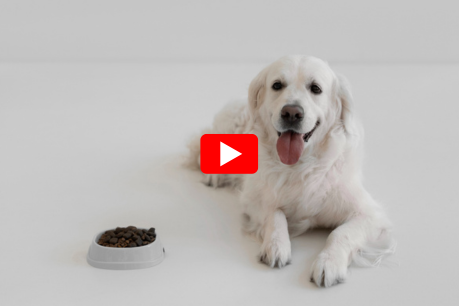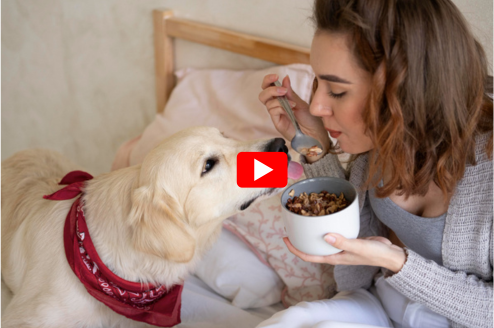Psyllium Husk Capsules for Dogs: Safe & Gentle Daily Care
Maintaining optimal digestive health is crucial for your dog’s overall well-being. Digestive issues like diarrhea, constipation, and anal gland problems are common concerns among dog owners.
While various treatments exist, many pet parents are turning to natural remedies to support their dogs’ digestive systems. One such remedy gaining popularity is psyllium husk.
Psyllium husk capsules aid dogs’ digestion, easing diarrhea, constipation, and anal gland issues. Always consult a vet for proper dosage
Psyllium husk, derived from the seeds of the Plantago ovata plant, is a soluble fiber known for its ability to regulate bowel movements and support gut health.
In this comprehensive guide, we’ll explore the benefits, proper usage, and considerations of using psyllium husk capsules for dogs.
What Is Psyllium Husk?
Psyllium husk is the outer coating of the seeds from the Plantago ovata plant. It’s rich in soluble fiber, which absorbs water and forms a gel-like substance in the intestines.
This property makes it effective in regulating bowel movements by softening stools in cases of constipation and firming them in cases of diarrhea.
Psyllium is commonly found in over-the-counter human laxatives like Metamucil® and is also available in capsule form for pets.
Benefits of Psyllium Husk for Dogs
Alleviates Diarrhea
Psyllium husk’s water-absorbing properties help firm up loose stools by absorbing excess moisture in the intestines.
This makes it an effective remedy for dogs experiencing diarrhea, including those with chronic large-bowel diarrhea.
In a study involving police working dogs with chronic large-bowel diarrhea, psyllium supplementation led to improved stool consistency and reduced defecation frequency.
Relieves Constipation
For dogs suffering from constipation, psyllium husk adds bulk to the stool and retains water, making it easier to pass. This gentle laxative effect can help alleviate discomfort associated with infrequent or difficult bowel movements.
Supports Anal Gland Health
Regular, firm stools are essential for the natural expression of a dog’s anal glands. Psyllium husk increases stool bulk, which can aid in the proper functioning of anal glands and reduce issues like impaction or infection.
Assists in Weight Management
The soluble fiber in psyllium husk promotes a feeling of fullness, which can help control a dog’s appetite and support weight management efforts. This is particularly beneficial for overweight dogs or those prone to overeating.
Regulates Blood Sugar Levels
Psyllium husk can slow the absorption of sugar in the digestive tract, leading to more stable blood sugar levels. This property is advantageous for diabetic dogs or those at risk of developing diabetes.
Proper Dosage and Administration
Dosage Guidelines
The appropriate dosage of psyllium husk for dogs depends on their size and specific health needs. General guidelines include:
-
Small Dogs (under 10 kg): 1/4 teaspoon per day
-
Medium Dogs (10–25 kg): 1/2 teaspoon per day
-
Large Dogs (over 25 kg): 1 teaspoon per day
It’s essential to start with a lower dose and gradually increase it while monitoring your dog’s response.
Administration Tips
-
Hydration is Key: Always administer psyllium husk with plenty of water to prevent potential gastrointestinal blockages.
-
Mixing with Food: Combine the appropriate dose of psyllium husk with your dog’s regular food. You can also mix it with a small amount of water to form a gel before adding it to their meal.
-
Consistency: For optimal results, administer psyllium husk consistently, preferably at the same time each day.
Potential Side Effects and Precautions
While psyllium husk is generally safe for dogs, it’s important to be aware of potential side effects and take necessary precautions:
-
Gastrointestinal Obstruction: Administering psyllium husk without adequate water can lead to esophageal or intestinal blockage.
-
Flatulence and Bloating: Some dogs may experience increased gas or bloating when first introduced to psyllium husk.
-
Allergic Reactions: Although rare, some dogs may be allergic to psyllium husk. Monitor for signs like itching, rash, or difficulty breathing.
-
Drug Interactions: Psyllium husk can interfere with the absorption of certain medications. It’s advisable to administer psyllium at least two hours before or after other medications.
Always consult your veterinarian before introducing psyllium husk into your dog’s diet, especially if your dog has existing health conditions or is on medication.
Choosing the Right Psyllium Husk Product
When selecting a psyllium husk product for your dog, consider the following:
-
Purity: Opt for products that contain 100% pure psyllium husk without added sugars, flavors, or artificial additives.
-
Form: Psyllium husk is available in powder and capsule forms. Choose the form that is most convenient for you and palatable for your dog.
-
Quality: Select products from reputable brands that adhere to quality standards and have positive reviews from other pet owners.
Incorporating Psyllium Husk into Your Dog’s Diet
Introducing psyllium husk into your dog’s diet should be done gradually:
-
Start Small: Begin with a lower dose than recommended to assess your dog’s tolerance.
-
Monitor: Observe your dog for any changes in stool consistency, frequency, or signs of discomfort.
-
Adjust as Needed: Based on your observations, adjust the dosage accordingly, always ensuring adequate hydration.
Consistency is crucial. Regular administration, combined with a balanced diet and proper hydration, can lead to significant improvements in your dog’s digestive health.
Conclusion
Psyllium husk capsules offer a natural and effective solution for managing various digestive issues in dogs, including diarrhea, constipation, and anal gland problems.
By understanding the benefits, proper usage, and potential risks, you can make informed decisions to support your dog’s gastrointestinal health.
Always consult your veterinarian before introducing new supplements to ensure they align with your dog’s specific health needs.
References Link
- Psyllium Dosage for Dogs
https://naturtotalshop.com/en/flohsamenschalen-hund-dosierung/
- Side Effects & Dosage Guidelines for Psyllium Husk in Dogs
https://www.despertarmagia.com/flea-seed-husk-dog-dosage-side-effects-effect/
- 5 Key Benefits of Psyllium Husk for Dogs
https://holistichealthhq.com/5-benefits-of-psyllium-for-dogs/
- Soluble Fibre for Large-Bowel Diarrhea in Dogs
https://pubmed.ncbi.nlm.nih.gov/33653329/
.



